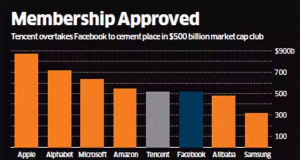In this era where social media rules everything, the creators of the all these platforms are constantly battling with the circling of fake news. This problem of fake news has drastically increased over the past few months with the increase of number of users in these platforms.
And it is no surprise that China’s tech giant Tencent is also facing this problem. Tencent’s signature application, WeChat, has around 1 billion users and it weeds out around 15 fake stories per second which makes it 1,000 stories per minute. This alarming rate of the fake news has alerted the developers of the platform to build strong softwares or utilize third party apps that can help find the fake articles and remove them instantly.
Tencent uses third-party fact checkers to help them eliminate the fake articles and information. They work with over 1,300 experts and institutions to fight the spread of fake information across all its major platforms including WeChat. Around 800 authorised third-party organisations have helped Tencent to shut down 180,000 accounts that published fake news on WeChat.
Additionally, the tech giant also uses another tool called WeSeer that enables them to monitor and keep an eye on the authenticity of content. It is a powerful software that can that can predict which articles are likely to go viral in the next hour, locate the key accounts driving the spread of information, identify stories of interest and break down readership by different segments, e.g., location, age and community. It has also launched a mini-app in WeChat to help users identify the authenticity of information circulating on the platform.
The company strongly believes that by making their AI more smart and more efficient in identifying and digesting information, it will prove to be a stronger method to eliminate the hoax articles and news.












